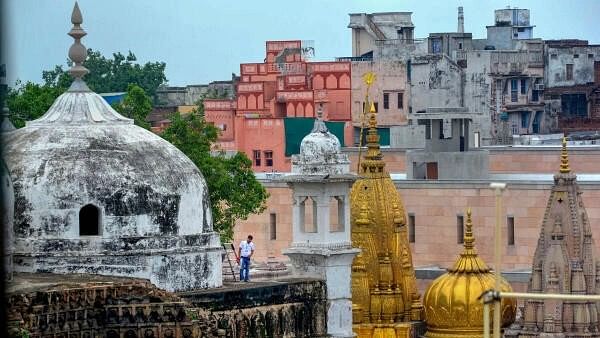
ASI team at Gyanvapi Mosque.
Credit: PTI Photo
Lucknow: In a significant judgement paving the way for the beginning of the trial of the Gyanvapi Mosque ownership dispute, the Allahabad high court on Tuesday rejected five petitions filed by the Gyanvapi Mosque Committee and UP Central Sunni Waqf Board challenging the civil suits pending in the Varanasi district court which sought the restoration of Temple at the Mosque site.
A single bench of the court headed by Justice Rohit Ranjan Agarwal also directed the Varanasi district court to complete the trial of one of the civil suits, which was filed in 1991 and sought ownership of the disputed place and right to worship there, within six months.
The court, in its verdict, said that the civil suit seeking control of the disputed place was maintainable and was not barred by the Places of Worship (Special Provisions) Act 1991. The Mosque Committee and the Waqf Board had contended that the civil suits were not maintainable under the Act.
The court said that the dispute was not between two parties and that it affected two large communities and was of national importance. It observed that the suits had been pending in the trial court for the past 32 years.
The court said that civil suits should be decided expeditiously and asked all the concerned parties to cooperate in their early disposal. It also directed the lower court not to adjourn the trial unnecessarily. '
The high court further asked the trial court to place the report of the Archaeological Survey of India (ASI), which conducted a scientific survey of the contentious Gyanvapi Mosque premises and submitted the survey report in a Varanasi district court on Monday, and also order fresh survey of the premises if required.
The court also said that the Places of Worship (Special Provisions) Act did not define religious nature and it only defined the religious place and conversion in the status of a religious place. The religious nature of a place could be decided by the competent court on the basis of evidence.
The first case with regard to the Gyanvapi Mosque was filed in Varanasi in 1991. The plaintiffs, who included Bhagwan Vishweshwar Virajman, and three others, had sought permission to worship in the Gynavapi Complex.
The judgement of the court came a day after the submission of the ASI report in the Varanasi district court.
The ASI, during the scientific survey, which had started on August 4, used ground penetrating radar and other scientific instruments to ascertain what lay beneath the surface of the Gyanvapi Mosque premises. The survey of the Gyanvapi Mosque premises began after the Allahabad high court rejected the petition filed by the Muslim litigants seeking a stay on the Varanasi court's order for a scientific survey by the ASI.
The premises had been a bone of contention between the two communities for the past several decades but there was renewed clamour to ''take back'' the Kashi Vishwanath Temple premises by the saffron outfits after the favourable decision of the apex court in the Ram Temple case.
The Hindu petitioners contended that a part of the temple had been demolished by the Mughal emperor Aurangzeb in the 17th century. The Muslim side contended that the Mosque existed before the reign of Aurangzeb and also claimed that the same had also been mentioned in the land records.